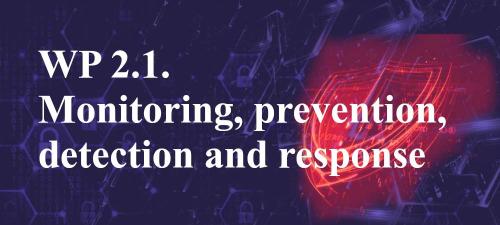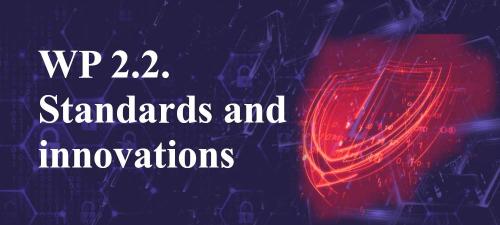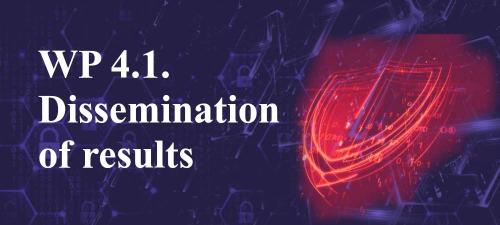Work packages and Tasks

WP 1.1. Management systems
WP leader: Rakovski National Defence College (RNDC)
WP contributors:
- Center for National Security and Defense Research – BAS (CNSDR)
- University of National and World Economy (UNWE)
- University of Library Studies and Information Technologies (ULSIT)
- Bulgarian Defence Institute (BDI)
- Ministry of Interior Academy (MOIA)
- Nikola Vaptsarov Naval Academy (NVNA)
- Vasil Levski National Military University (VLNMU)
- Georgi Benkovski Air Force Academy (GBAFA)
WP objectives:
The increase of scientific capacity and the development of basic aspects of scientific research, scientific and applied activities in the direction of "Management Systems" for increasing the security of society and the defence of the country. Research, development and/or proposal for implementation in practice of conceptual innovative models in the security and defence of the state, including through cyber security and cyber defence, through targeted scientific research. Design, development and proposals for the implementation of innovative management, monitoring and response systems in the national and collective security system. Finding rational approaches for the development of the technical assurance of the systems and elements of the National Security System.
WP tasks:
- Task 1.1.1. Analysis and evaluation of command and control systems of EU and NATO armed forces and multinational forces.
- Task 1.1.2. Analysis and evaluation of disaster, accident, emergency and crisis management systems and development of science-based proposals for their improvement.
- Task 1.1.3. Analysis and evaluation of anti-terrorist activity management systems and development of scientifically based proposals for their improvement.
- Task 1.1.4. Analysis and simulation modeling of the interaction of national security systems during disasters, accidents and other crisis situations related to cyber security and cyber defence.
- Task 1.1.5. Analysis and modeling of the energy supply system of the Republic of Bulgaria during disasters, accidents, crises and its effective management.
- Task 1.1.6. Analysis of risk and threats, design and development of conceptual generating models and software to increase the effectiveness of management of forces and means of impact on critical infrastructure during natural disasters, accidents and crises on the territory of the Republic of Bulgaria.
- Task 1.1.7. Analysis and evaluation of the management of the border areas of the country in the conditions of risk for national security.
- Task 1.1.8. Analysis and evaluation of the management of risky migrant pressure.

WP 1.2. Technological assurance
WP leader: Bulgarian Defence Institute (BDI)
WP contributors:
- Center for National Security and Defense Research – BAS (CNSDR)
- University of National and World Economy (UNWE)
- University of Library Studies and Information Technologies (ULSIT)
- Rakovski National Defence College (RNDC)
- Ministry of Interior Academy (MOIA)
- Nikola Vaptsarov Naval Academy (NVNA)
- Vasil Levski National Military University (VLNMU)
- Georgi Benkovski Air Force Academy (GBAFA)
WP objectives:
The purpose of the work package is to research the possibilities for technological provision and development of means for obtaining and transmitting sensory information, of systems based on artificial intelligence, of possibilities for modeling communication and information systems with a digital model of the area, of cloud technologies and collaborative systems, accident, disaster and catastrophe risk research.
This package will help explore the possibilities of new technologies in innovative control, monitoring and response systems in the system of national and collective security, as well as a deeper understanding and description of digital models, of intelligent technologies and support systems for decision-making disaster, accident and crisis solutions.
WP tasks:
- Task 1.2.1. Research and application of land, water and unmanned aerial vehicles for logistics, extraction and remote transmission of sensory and visual information.
- Task 1.2.2. Intelligent technologies and computer systems to support decision-making based on the modern achievements of artificial intelligence.
- Task 1.2.3. Research on robotic and machine learning-based systems for environmental analysis and decision-making, as well as prototyping based on the application of artificial intelligence and robotics.
- Task 1.2.4. Development of an automated system for determining the functional and structural characteristics of aerodynamic conceptual models for the study of autonomous platforms at high speeds.
- Task 1.2.5. Research, development and improvement of communication and information systems for early warning and disclosure in the use of nuclear, chemical and biological weapons.
- Task 1.2.6. Modeling of communication and information systems with the application of a digital model of the locality.
- Task 1.2.7. Cloud technologies and systems for collaboration work with an application in the defence of the state and public security.
- Task 1.2.8. Research, development and improvement of sensor networks, technologies and systems for obtaining timely operational information from the scene of a crisis situation and its transmission to the operational headquarters.
- Task 1.2.9. Research and application of passive software-defined and multi-sensor radar systems for state defence and public security.
- Task 1.2.10. Development of software for determining the places with a high degree of risk for the occurrence of disasters, accidents and catastrophes on the territory of strategic objects of the critical infrastructure and the population therein.

WP 2.1. Monitoring, prevention, detection and response
WP leader: University of Library Studies and Information Technologies (ULSIT)
WP contributors:
- Center for National Security and Defense Research – BAS (CNSDR)
- University of National and World Economy (UNWE)
- Rakovski National Defence College (RNDC)
- Bulgarian Defence Institute (BDI)
- Ministry of Interior Academy (MOIA)
- Nikola Vaptsarov Naval Academy (NVNA)
- Vasil Levski National Military University (VLNMU)
WP objectives:
- Development of an innovative conceptual generative model for ethical behavior and management of forces and resources by state and local government agencies in a modern cyber environment.
- Development of a methodology for complex strategic analysis, a synthesized scientific conclusion and a message on security and defence issues.
- Development of analytical and statistical models for assessing the impact of risks and threats on critical information systems, determining and evaluating the effectiveness of methods for protecting them in the Republic of Bulgaria.
- Development of analytical and statistical models for assessing the influence of disruptive effects on the security of information exchange and evaluating the effectiveness of protection against disruptive effects.
WP tasks:
- Task 2.1.1. Development and testing of a conceptual model for ethical behavior and management of forces and resources by state and local administration bodies in a modern cyber environment.
- Task 2.1.2. Analysis and development of methods and metrics for cyber security assessment and management of forces and resources by state and local administration bodies in incidents, disasters, accidents and catastrophes.
- Task 2.1.3. Research on the security of critical information systems for the needs of government.
- Task 2.1.4. Research of the security of communication infrastructure when implementing interoperability between different information systems and drawing up conceptual models.

WP 2.2. Standards and innovations
WP leader: University of National and World Economy (UNWE)
WP contributors:
- Center for National Security and Defense Research – BAS (CNSDR)
- University of Library Studies and Information Technologies (ULSIT)
- Rakovski National Defence College (RNDC)
- Bulgarian Defence Institute (BDI)
- Ministry of Interior Academy (MOIA)
- Nikola Vaptsarov Naval Academy (NVNA)
- Vasil Levski National Military University (VLNMU)
WP objectives:
The purpose of the work package is to analyze and develop standards for state security and cyber intelligence. Also through this package, innovative prototypes for information protection, cyber security and cyber defence will be created. The development of this package will enable the use of new applications of digital technologies in the defence and security sector, brought by the ever-increasing penetration of information technology and artificial intelligence in our society.
WP tasks:
- Task 2.2.1. Modern techniques for information protection.
- Task 2.2.2. Prototyping a brain-computer interface-based user authentication system for secure information systems.
- Taks 2.2.3. Design and prototyping of an innovative hybrid cyber security and cyber defence system with innovative features for monitoring, prevention and detection of data flow in digital configurations.
- Task 2.2.4. Analysis of standards and design of a classification model and taxonomy of modern cyber attacks and cyber incidents.
- Task 2.2.5. Analysis of innovative models and algorithms for the use of large data sets (Big Data) in digital forensics for the prevention of high-tech criminal encroachments on the security of the state.
- Task 2.2.6. Analysis and development of standardized procedures, methods, technologies and techniques for cyber intelligence.

WP 3.1. Equipment
WP leader: Vasil Levski National Military University (VLNMU)
WP contributors:
- Center for National Security and Defense Research – BAS (CNSDR)
- University of Library Studies and Information Technologies (ULSIT)
- Rakovski National Defence College (RNDC)
- Bulgarian Defence Institute (BDI)
- Ministry of Interior Academy (MOIA)
- Nikola Vaptsarov Naval Academy (NVNA)
- Georgi Benkovski Air Force Academy (GBAFA)
WP objectives:
The purpose of the work package is to explore the possibilities of creating and synthesizing working prototypes of specialized components of equipment and/or equipment of individuals or groups of individuals performing specific tasks. This package will help introduce new technologies in the creation of new advanced personal protection equipment (nanotechnology), new powerful energy sources and new ammunition.
WP tasks:
- Task 3.1.1. Research and application, in the field of security and defence, of renewable and chemical sources of electricity and the possibilities of using non-volatile sources based on lithium.
- Task 3.1.2. Development of a "flow-fuel" (flow-fuel cell) zinc-air battery based on cheap and ecological bulgarian materials for the use of energy-independent sources to provide the critical infrastructure in the event of disasters, accidents and catastrophes.
- Task 3.1.3. Investigating the applicability of new nanomaterials and technologies in security and defence.
- Task 3.1.4. Research, development and improvement of munitions.
- Task 3.1.5. Research, development and improvement of means for individual and collective ballistic protection and protection against nuclear, chemical and biological weapons.
- Task 3.1.6. Studies of issues related to providing safe and complete nutrition to individuals in individual food rations of freeze-dried foods for emergency feeding, survival and individual food kit for a 30-day period.
- Task 3.1.7. Design and construction of a sensor system (optical-electronic/acoustic/thermovision) for detection, tracking and blocking (destruction) of drones.
- Task 3.1.8. Research, design and development of a recognition system through the analysis of biometric data using artificial intelligence.
- Task 3.1.9. Construction of a network of autonomous low-powered aerial devices (quadracopters) to control an urbanized area.

WP 3.2. Doctrines and strategies
WP leader: Rakovski National Defence College (RNDC)
WP contributors:
- Center for National Security and Defense Research – BAS (CNSDR)
- University of National and World Economy (UNWE)
- University of Library Studies and Information Technologies (ULSIT)
- Bulgarian Defence Institute (BDI)
- Nikola Vaptsarov Naval Academy (NVNA)
WP objectives:
An exploration of security concepts, doctrines and strategies through modeling of the national security system and the state-security nexus. Through research on demographic, psychological and social aspects of national security, to define problems and find solutions related to the human factor in security, as well as finding ways to increase public support for defence and security policy. Reducing threats from the harmful consequences of disasters, accidents and catastrophes. Establishment of a criterion system for evaluating the effectiveness of planning and management of the security of society and the defence of the state. Construction of a database and development of specialized software for automated processing and analysis to ensure operational crisis management.
WP tasks:
- Task 3.2.1. An exploration of security concepts, doctrines, and strategies. Modeling the national security system and the state-security system.
- Task 3.2.2. Research in the field of demographic, psychological and social aspects of national security. Human Factors in security and public support for defence and security policy.
- Task 3.2.3. Dynamic modeling of risks and threats in disasters and accidents with real-time information provision from autonomous land, water and air assets.
- Task 3.2.4. Analysis of the security and defence policy of the Republic of Bulgaria. Systematization of criteria for evaluating the effectiveness of planning and management of public security and state defence.
- Task 3.2.5. Construction of a database and development of specialized software for automated processing and analysis of Big data to ensure the functionality of the National Situation Center (NSC) and Crisis Management Center (CMC).

WP 4.1. Dissemination of results
WP leader: Nikola Vaptsarov Naval Academy (NVNA)
WP contributors:
- Center for National Security and Defense Research – BAS (CNSDR)
- University of National and World Economy (UNWE)
- University of Library Studies and Information Technologies (ULSIT)
- Rakovski National Defence College (RNDC)
- Bulgarian Defence Institute (BDI)
- Ministry of Interior Academy (MOIA)
- Vasil Levski National Military University (VLNMU)
- Georgi Benkovski Air Force Academy (GBAFA)
WP objectives:
- Reaching the results to the widest possible audience of representatives not only of the scientific circles, but also of the entire public.
- Dissemination of information between the consortium and the stakeholders through a specially created website of the program.
- Organization of scientific forums and promotion of intermediate results of the program.
- Increasing the knowledge of students, cadets, PhD students and young scientists on security and defence issues.
- Dissemination of results through scientific networks and participation in bulgarian and international scientific forums.
- Publication of a collection of reports with the results of scientific research.
- Application of the obtained results of military scientific research in the process of training in the field of security and defence.
WP tasks:
- Task 4.1.1. Plan for dissemination of results.
- Task 4.1.2. Organizing an annual conference.
- Task 4.1.3. Organization of thematic seminars.
- Task 4.1.4. Program website and social media publicity.
- Task 4.1.5. Development of scientific publications, participation in seminars, conferences and forums.
- Task 4.1.6. Participation in scientific and applied forums with the attraction of business representatives.

WP 4.2. Program management
WP leader: Bulgarian Defence Institute (BDI)
WP contributors:
- Center for National Security and Defense Research – BAS (CNSDR)
- University of National and World Economy (UNWE)
- University of Library Studies and Information Technologies (ULSIT)
- Rakovski National Defence College (RNDC)
- Ministry of Interior Academy (MOIA)
- Nikola Vaptsarov Naval Academy (NVNA)
- Vasil Levski National Military University (VLNMU)
- Georgi Benkovski Air Force Academy (GBAFA)
WP objectives:
The purpose of the package is to manage the program according to the agreement between the Ministry of Edication and Science and the coordinator and the agreement between the participating partners in accordance with the guidelines and requirements of the RMS; to coordinate activities and ensure scientific and expert dialogue within the consortium; monitor and adjust the implementation plan; to ensure the creation of a stable system for the protection of the results obtained as a result of the implementation of the program.
WP tasks:
- Task 4.2.1. Program Management Plan.
- Task 4.2.2. Technical management and program reporting.
- Task 4.2.3. Program financial management and reporting.
